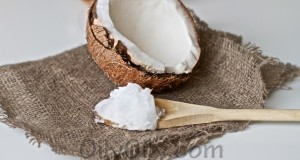
Olive oil is derived from crushed and pressed olives, is an important part of the Mediterranean diet. It is considered to be one of the healthiest dietary oils and is widely used for cooking, seasoning and flavoring. The most beneficial for health are virgin and extra virgin types of olive oil as they are minimally processed. As the content of calories in olive oil is rather high, it is a good source of nutrients to our body. Nevertheless, being a pure fat, olive oil should be taken in moderation as any other high-calorie food. Therefore it is very important to know how many calories olive oil contains and olive oil nutrition facts.
Contents
Calories and Fats
There are about 119 calories in one serving of olive oil which is 1 tablespoon. All of these calories come from fat. This means you should be mindful not to add too many calories into your diet with this particular product.
An average adult needs from 20 to 35% of daily calories to come from fats. As it was mentioned before, olive oil is a pure fat, which consists from saturated (about 14%) and unsaturated fats (about 86%). As the unsaturated fats in olive oil are predominant, it is considered to be healthy and good for heart. The unsaturated fats are mostly monounsaturated (approximately 73% of all fats). They work to reduce ‘bad’ cholesterol level in your blood thus preventing from heart diseases. Olive oil provides to human’s body omega-9 fatty acids, omega-6 fatty acids and omega-9 fatty acids (also called oleic acids). This makes olive oil nutrition source of the highest quality with various health benefits.
SEE ALSO: 6 Substitutes for Olive Oil
Vitamins
Olive oil is rich in Vitamin K (62mcg in 100g of oil), which is mostly found in leafy green vegetables. This vitamin is necessary for good blood clotting and the maintaining of bone density. 100g of olive oil provides 59% of recommended daily allowance of Vitamin K. Another very important vitamin contained in olive oil is Vitamin E. It is needed for cardiovascular health. 100g of olive oil covers almost total recommended daily allowance of this vitamin (93%).
Minerals and Polyphenols
Iron, potassium, sodium and calcium are the minerals contained in olive oil. They have several functions, the most important of which is to support cardiovascular system. Iron’s function is to help red blood cells to move oxygen to all cells in our body. The nerves and muscles proper function depends on such electrolytes like potassium, sodium and calcium. This makes olive oil to be a good source of minerals needed for your heart and body on the whole. What is more, olive oil contains polyphenols, which are antioxidants derived from plants. They protect the cells of your body from damage. The highest amounts of polyphenols can be found either in virgin or in extra virgin olive oils.
Use
Being aware of olive oil calories content and other nutrition facts will help you to use this oil with the maximum benefits to your health. Use the high-quality extra virgin oil sparingly, do not overeat it and you won’t have any problems with weight gain and other fat-related diseases.
 Oilypedia.com – Benefits And Uses Of Supplemental and Essential Oils
Oilypedia.com – Benefits And Uses Of Supplemental and Essential Oils 


